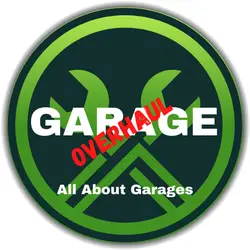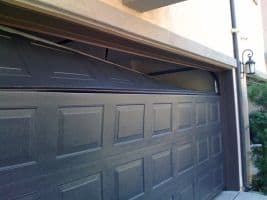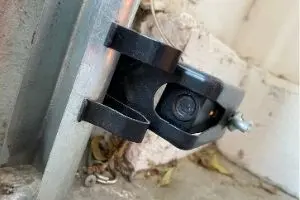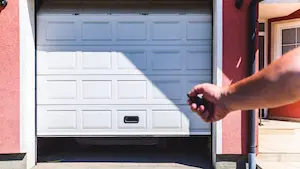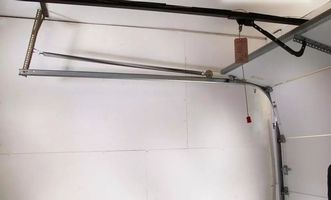Different Types of Garage Door Openers (Info & Cost)
This post contains affiliate links.
Garage door opener systems make our garage doors light and easy to open. Without it, you will have to exert much effort to move the door leaves. Garage door openers also come in many types, each with weaknesses and strengths.
If you want to install one, it can be hard to choose. Perhaps understanding the types available is a good start. What are the different types of garage door openers?
The most popular garage door opener types are:
- Chain Drive
- Belt Drive
- Screw Drive
- Direct Drive
- Jackshaft / Wall Mounted
In this article, we explore the different types of garage door openers and which one may work best for you. We also look into the popular brands of garage door openers.
Finally, we answer some common questions you may have about them.
What Types Of Garage Door Openers Are There?
The major garage door openers in the market today are chain, belt, screw, or direct-driven. There are also wall-mounted systems. Each of these systems has its own strengths and weaknesses. Not all of them may suit your garage too.
| System | Pros | Cons | Cost |
| Chain Drive | -Cheap. -Easy to maintain. -Reliable. | -Loud and noisy. | $120 – $270 |
| Belt Drive | -Quiet operation. -Easy to maintain. -Reliable. | -Slightly Expensive. | $160 – $450 |
| Screw Drive | -Fast. -Easy to maintain. -Good with large doors. | -Expensive. -A little noisy. -Sensitive to cold temperature. | $200 – $500 |
| Direct Drive | -No intermediary. -Easy Maintenance. | -Costly. -Difficult to install. | $200 – $450 |
| Wall Mount | -Good with low ceilings. -Easy to maintain. | -Expensive. | $250 – $600 |
Chain Drive
Chain-driven garage door openers are probably the most common system you can see. It basically uses a chain to move the trolley on the track to open the garage door.
Chain drive systems are very popular for several reasons. First, they are affordable. The simple technology also makes it easy to maintain. It is also very reliable, as it has few moving or complicated parts.
The downside? Noise. Chain drive garage door openers can be loud and clunky. Chain-driven systems may be best for detached garages, as the noise can be penetrating. A basic chain-driven garage door opener system should cost around $120 to $270.
Belt Drive
Belt-driven garage door systems use belts instead of chains to operate. The belt is usually made of steel-reinforced rubber, fiberglass, or polyurethane. The belt also has nubby teeth, similar to a timing belt in a car engine.
One of the best things about belt drive systems is their quietness. As a result, many install the system on attached garages.
It is almost the total opposite of chain-driven systems but equally reliable. Many also see belt drives as more reliable than chain or screw drives.
The issue with belt-driven systems is that they are slightly more expensive. You may want to keep using chain drives if this is an issue. A belt-driven garage door opener system costs around $160 to $450.
Screw Drive
Screw-driven garage door opener system spins a threaded steel rod. As the rod spins, it moves the trolley in the track, opening or closing the garage door.
There are many upsides to a screw-drive system. It operates fast, so your door opens and closes quickly and smoothly. It also has fewer parts and moving components than chain or belt-driven systems.
Screw-driven systems are popular with large garages with huge and heavy doors. Maintenance is also a breeze.
Screw drive can be noisy, but not to the level of chain-driven systems. It is also sensitive to temperature changes since the screw grooves may ice up. It may require more frequent lubrication.
Screw-driven systems are also more expensive compared to chain or belt systems. Expect to shell out $200 to $500 to set up one.
Direct Drive
Direct drive systems are what you call an all-in-one system. It does not rely on chains, belts, or screws to move the garage door. Instead, the motor is a trolley and travels along the garage door track.
It operates quietly and should do well in an attached garage. It also moves strongly, giving you the confidence that the motor is more than capable of doing the job. Maintenance is also easy.
Is it the downside? Cost and installation. Direct drive systems are more expensive compared to other systems. It is also more complicated to install since you must mount the motor directly on the door.
Setting up a direct drive garage door opener system should cost around $200 to $450.
Jackshaft / Wall-Mounted
Wall-mounted garage door opener system is installed on the side of the door. They are also installed directly to the torsion bar.
Wall-mounted systems are also called the jackshaft system. This system is quite popular with garages with low ceilings.
The system does not need a chain, belt, or screw. It also does not need a steel track for the direct drive motor. Wall-mounted systems save overhead space for you to mount more ceiling storage racks.
Wall-mounted systems, however, can be expensive. It should cost you anywhere between $250 to $600 to set one up, the most expensive of all the other systems on the list.
What Motor Do Garage Door Opener Systems Use?
Garage door opener systems tend to use DC-powered motors. This is because the DC motor is smaller. It also operates more quietly and smoothly compared to AC motors. Some DC motors also come with battery backup, allowing operation even when power is out.
You usually see garage door opener systems with a motor. The motor powers the movement that opens and closes the door.
The motor usually runs on alternating (AC) or direct (DC). Both plug into a standard home power outlet, but DC-powered openers convert AC to DC power.
The advantage of a DC motor is the size. It also operates quietly and has smoother starts and stops. Some DC-motor openers include battery backup, allowing operation when the power is out.
Garage door openers with DC motors may use ratings such as horsepower to show their power.
The score tells you the DC motor’s pulling power compared to an equal AC motor. It’s a sign of the actual HP rating of the DC motor.
As a result, DC-powered motors have become the standard in the garage door industry.
How To Choose The Best Garage Door Opener?
When choosing the best garage door opener, consider factors such as:
- Price
- Features
- Horsepower
- Compatibility
- Age
- Usage
- Warranty
Many factors may come into play when shopping for a garage door opener. You may want to take a look at these parts before making your purchase.
Price
Garage door opener systems can range quite widely in price. Lower-end, simple garage door opener systems may cost you roughly $120. Higher-end systems may be priced at $500 or more, depending on features and types.
You generally buy a garage door opener system with railings, doors, etc. This means they may cost you a lot. As a result, you want to ensure everything is priced before you make your final decision.
How Much Do Garage Door Openers Cost, and What About Installation or Repair Costs?
If you want the job done by professionals or DIY, Here is up-to-date info at Homeadvisor.com and Homeguide.com
https://www.homeadvisor.com/cost/garages/install-a-garage-door-opener/
https://www.homeadvisor.com/cost/garages/repair-a-garage-door-opener/
https://homeguide.com/costs/garage-door-opener-installation-cost
https://homeguide.com/costs/garage-door-repair-cost#opener
Garage Door Opener Features
Garage door openers can come with a dizzying array of features. Many of these features increase its performance, safety, and also control. There are also smart features that allow controls from smartphones.
Remote and Keypad Control: Many garage door openers have remote or keypad control. This allows wireless control to open and close the doors. This means you do not need to leave your car just to access the door.
Manual Release: Manual release is a feature allowing you to manually open the garage door. You usually disengage the opener from the inside of your garage. This is a handy feature in situations without electricity to power the motors.
Security Lights: Security light beams on when the garage door system operates. This serves as a visual cue for others to see that the door is opening or closing, so everyone can keep clear.
Rolling Code: A code allows your remote control and the garage door opener to recognize each other. This prevents another remote from being able to open your garage door. However, hackers can discover the code. A rolling code frequently changes the codes to make your garage door harder to hack.
Rail Segments and Extensions: Rail segments and extensions are required to help operate larger, taller garage doors. Usually, you may see them with garage doors that are 7 feet or taller.
Safety Sensors: Safety sensors usually help sense if something is in the way of the door. When the sensors detect something, it automatically stops operating. This prevents the door from crushing its weight on you, people, or objects nearby.
Wi-Fi and Smartphone Controls: Modern garage door systems now use internet-based controls, such as Wi-Fi or Bluetooth. This means you can control your garage door openers using an internet application. Many also allow you to pair the motor to your phones, allowing you to control the garage door through an app.
Battery Backup: Some DC-motor-powered garage door opener carries a battery backup. This helps the garage door opener to continue operating, even if there is a power outage. Battery backup typically holds enough charges for many cycles of operations.
Automatic Locking: Sometimes, we forget to lock the garage door after closing it. Automatic locking systems may detect this. Then, it automatically locks the garage door after a set time.
Auto-Close Functionality: Similarly, we may forget to close the garage door. Suppose your garage door opener comes with an auto-close functionality. In that case, the system may close the garage door several minutes after opening.
Read More: Smart Garage Door Openers
Garage Door Opener Horsepower
| Door | Door Weight | Recommended Lifting Force |
| Single Doors | Up to 150 lbs | ¼ or ⅓ horsepower |
| Single and Double | Up to 350 lbs | ½ horsepower |
| Double | Up to 600 lbs | ¾ horsepower |
| Special | Up to 740 lbs | 1 horsepower |
| Commercial | Up to 750 lbs | 1 ¼ horsepower |
Depending on the weight of your garage door, you may require a different set of door openers. The heavier and bigger your garage door is, the bigger horsepower is needed to lift and close it.
The right springs and garage door opener motor could generate a lifting forge.
For example, suppose your garage door weighs 350 pounds. In this case, the advice is to set up a garage door spring to generate ½ horsepower of lifting force.
Too little, and then the garage door becomes too heavy for you to lift. Too much lifting force and your garage door may not shut down properly. It may also pull the garage door with too much force, causing it to slam.
Your garage door should only feel 10 to 20 pounds if paired with the right garage springs. This means you can open and close the door with one hand. This will also relieve your garage door opener motor from working too hard.
Compatibility
You want to ensure the garage door opener system you are getting can work with your garage door. This is because some garage door opener systems work better with small doors. Some will work well with larger doors.
For example, a wall-mounted system may work well for a small garage, as it does not occupy much ceiling space. However, you may want a more robust system for a larger garage, such as a chain drive or a screw-driven system.
Age
Suppose you have an old garage door opener system. In this case, consider upgrading to a newer one to benefit from many features. Those with garage door openers made before Jan 1, 1993, stand to gain the most from upgrading.
Older garage door opener systems may not have rolling codes or safety sensors. This means the garage door is less safe and prone to hacking.
Older motors on these opener systems may also function less well. The older technology inside may consume more electricity than needed.
Usage
Garage door openers are generally built to withstand frequent use. However, suppose you intend to open and close your garage door more frequently than usual. In this case, consider using more reliable and durable systems.
In this case, consider chain, belt, or screw-driven systems. These systems are technically simple, with fewer moving parts. Fewer parts mean fewer points that could cause issues.
You also want to perform more maintenance to ensure they remain in good working order.
Garage Door Opener Warranty
| Brand | Parts | Motor | Drive System | Accessories |
| Chamberlain | 3 years | Lifetime | – | 1 year |
| Genie | 1 to 5 years | 5 to 7 years | 15 years to lifetime for belts 5 years for chains | 1 year |
| Skylink | 1 year | 1 year | 1 year | 1 year |
| Decko | 1 year | Lifetime | 1 year | 1 year |
| LiftMaster | 5 to 10 years | 5 to 10 years | 5 to 10 years | 5 to 10 years |
| Sommer | Lifetime | Lifetime | Lifetime | 2 years |
A manufacturer should stand behind their products. This means they should be able to offer you a generous warranty. You should assume the same with garage door opener systems too.
Most major garage door manufacturers offer warranties for their systems. This means you should be able to have some protection for your purchase. You should also get good after-sale service for your purchase.
Who Are The Popular Garage Door Opener Manufacturers?
The most popular and common garage door manufacturers are:
- Chamberlain
- Genie
- Liftmaster
- Guardian
- Overhead door
- Skylink
- Sommer USA
- Marantec America
- Lynx
When it comes to garage door openers, there are many manufacturers. It can be dizzying trying to decide which you may prefer.
Here, we list several of the most popular manufacturers and review them generally. You can then do your homework before deciding which systems to get.
Chamberlain
Chamberlain is based in Oak Brook, Illinois, and is part of the Chamberlain group. Its sister brands include the famous Craftsman garage tools, Liftmaster, and Grifco. Chamberlain was founded in 1954, which means they have been in business for over 70 years.
Chamberlain’s garage door opener system has strong safety and security features. These include rolling codes, which prevent hacking.
Chamberlain’s garage door openers also have sensors. These sensors detect objects in the door’s path. It stops automatically if it detects something.
Genie
The Genie company is a popular maker of garage door opener systems based in Mt. Hope, Ohio. It was founded in 1923 and made various consumer, industrial, and military products.
Its first garage door openers were introduced in 1954 and have been in the market ever since.
Genis is known for using smart technology on their garage door opener systems, such as Wi-Fi. You can control your garage door openers using your smartphone. You can also monitor their status remotely.
LiftMaster
LiftMaster is a sister brand to Chamberlain, another maker of garage door openers. You can assume that Chamberlain’s garage door openers are for home use.
For example, LiftMasters’s garage door opener systems are for professionals in more commercial and industrial settings.
Like Chamberlain’s systems, LiftMaster’s systems focus on reliability, durability, and safety. LiftMaster also integrates technology into its products. This allows you to use your smartphone to control your garage doors.
Guardian
Guardian is a small, family-oriented door solutions manufacturer based in Richardson, Texas. Aside from garage door openers, it also makes door-related products. Examples include radio controllers, rollers, and so on.
Aside from home, Guardian also has commercial garage door openers. There are also smart control kits that you can install on your Guardian garage door openers. This way, you can control them using a smartphone.
Overhead Door
Overhead Door may be the OG of garage door openers, as it was founded by C.G Johnson himself. C.G. Johnson invented the upward-lifting garage door in 1921. He also invented the electric garage door opener in 1926.
Overhead Door makes garage doors, and the opener system moves them. These opener systems are reliable, tough, and safe. Many of their motors are also made to operate quietly. They added sound insulation to reduce noise.
Skylink
Skylink is a Canadian home automation tool maker based in Mississauga, Ontario. They also have a US office in Ontario, California. Their manufacturing plant is in Vietnam.
The company makes a wide variety of home automation and safety equipment. There are alarms and controls for gates and doors. Skylink also makes garage door openers of various types.
Skylink also has an online system called the Skylink Net. With it, you can use the internet to control your doors or gates. Just pair your smartphone with the system, and you are ready.
Sommer USA
Sommer produces garage door openers, accessories, and remote control systems. It is based in Kirchheim Unter Teck, Germany. Its US distribution and operation office is in Charlotte, North Carolina.
Sommer USA’s garage door opener systems are durable and operate very smoothly. It also comes with remote controls. You can also pair the garage door opener with your smartphone. This means their openers have Wi-Fi or Bluetooth-based connectivity.
Sommer’s garage door opener systems also have safety features. These include sensors to detect objects along its path. It stops when something is approaching the door, preventing accidents.
Marantec America
Marantec has been making garage door controls and openers since 1989. It has offices in Germany, Switzerland, France, Italy, Poland, the UK, and the US. Its US office is in Gurney, Illinois.
Marantec’s garage door opener systems can be used for residential and commercial uses. The residential garage door openers are smaller. They are also simpler than the commercial ones.
However, both can be operated remotely using a remote control or smartphone. It is a brand worth checking out if you want a garage door opener system.
Lynx
Lynx is a Canadian manufacturer of garage and trailer products. They make garage doors, accessories, and also garage door opener systems. You can also buy garage door torsion and extension springs here.
Lynx operates in Mississauga, Ontario. It also acquired the Napoleon Spring Works in Archibald, Ohio, in 1986, making it a US-based company. Lynx’s products are distributed to over 40 countries around the world.
Lynx’s garage door openers come in many types and are durable. They are reliable and can operate via Wi-Fi, Bluetooth, or regular remote control. They also come with safety systems to avoid accidents or mishaps.
What Are The Signs Of A Malfunctioning Garage Door?
Signs of a malfunctioning garage door include:
- Unusual noise
- Slow Door Movement
- Vibration
- No Movement
- Unpredictability
Garage door opener systems are generally quite robust. However, they may malfunction over time. These malfunctions may be attended to with simple maintenance work.
However, these problems may be signs of more extensive issues. You may require the replacement of your garage door opener systems.
Unusual Noise
As motors age, they may deteriorate in their functionality. The gears may not be as tightly keyed in, nor the motors generate enough lifting power.
You may hear clanging, creaking, or squealing when these motors operate. When this happens, call an expert to check the motor out. This prevents the deterioration from worsening.
Slow Door Movement
Garage door opener motors may become weak over time. Things may get dirty inside, and the grease no longer lubricates well.
The extension of torsion springs may have also lost its strength. This means the springs are not generating enough lift to assist the motor.
This man made the garage door operate slower than usual, especially when lifting. If you notice slower door movement, it may be time to give your garage door opener system a checkup.
Vibration
When the motor wears and tears, it starts to vibrate. At first, this is almost imperceptible. Sometimes you may notice some vibration on the garage door rail, but nothing unusual.
However, the motor may loosen gradually and begin to free itself from mounting on the roof. If you are unlucky enough, the motor may fall off and end up on the roof of your car.
Before that happens, you should avoid damage by checking your garage door system.
Unpredictability
At this point, you may notice your garage door opener system showing erratic behavior. At times it opens well and smoothly. However, you may need to operate the system several times to get it moving.
In this case, it could be something as simple as a loose plug all the way to a malfunctioning motor. Get your system checked to resolve the issue.
No Movement
This may be when people realize something is wrong with the garage door opener. You may hear the motor operating, but the garage door is not moving. This may mean the motor or spring is not generating enough lifting power.
At times, the motor may not even be operating. This means something is wrong with the motor. Consider getting your garage door opener checked out and replacing what is required.
Read More: Common Garage Door Opener Problems
FAQ About Garage Door Openers
How Much Does a Garage Door Weight?
The garage door usually weighs around 80–300 pounds. The final weight may depend on the material, thickness, or more.
For example, if you are to make your garage door out of 25-gauge sheet steel. The garage door measures 16 feet wide to 8 feet tall. Your garage door should weigh around 75 to 90 pounds (about 34 – 41 kg).
However, the weight can increase significantly. This is if you switch to more solid, thicker materials.
Suppose your garage door is made from heavy wood, such as oak. Your oak garage door measures 8 feet wide and 8 feet tall. In this case, your garage door would weigh up to 300 pounds (about 137kg).
Read More: Different Types of Garage Doors
Can A Garage Door Opener Be Too Powerful?
Yes, but the difference may not be too noticeable. Generally, the springs work with the motor to operate the garage door. The springs carry most of the lifting force, with the motor replacing the input from your end.
You can use springs with larger horsepower counts. Generally, you may notice slightly faster operation. Additional horsepower may be good, so your springs and motors are not too overloaded.
How Long Do Garage Opener Doors Last?
Most garage door opener systems are designed to last over 10,000 cycles. Depending on your frequency of use, your garage door openers may be able to last you years. With good care and regular maintenance, they may even last you decades.
